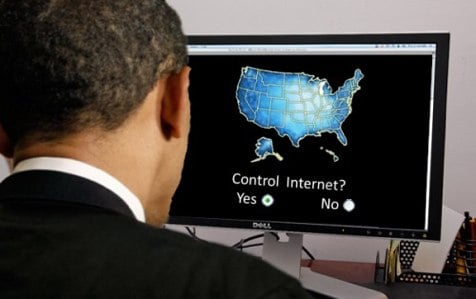Find Our Latest Video Reviews on YouTube!
If you want to stay on top of all of our video reviews of the latest tech, be sure to check out and subscribe to the Gear Live YouTube channel, hosted by Andru Edwards! It’s free!
Friday January 28, 2011 6:50 pm
Will the US get an Internet Kill Switch like Egypt?

With reports of Egypt's government completing shutting down the Internet in the country, talk about an "Internet kill switch" bill in the U.S. has reemerged. Could it happen here?
The bill in question is the Protecting Cyberspace as a National Asset Act of 2010, a cyber-security measure introduced in June by Sen. Joseph Lieberman. It was an over-arching cyber-security measure that, among other things, would create an office of cyberspace policy within the White House and a new cyber-security center within the Homeland Security Department.
A provision that got the most attention, however, was one that gave the president the power to "authorize emergency measures to protect the nation's most critical infrastructure if a cyber vulnerability is being exploited or is about to be exploited."
Some interpreted that to mean that the president would have the authority to shut off the Internet at random. Lieberman refuted the "Internet kill switch" assertion as "misinformation" during an appearance on CNN, and the Homeland Security and Governmental Affairs Committee, which he chairs, later published a "myth vs. reality" fact sheet on the bill.
The bill passed the committee, but did not see any significant action before the end of the session. Earlier this week, however, CNet reported that Lieberman will re-introduce the bill in this Congress, and that the updated bill will include a provision that says "the federal government's designation of vital Internet or other computer systems 'shall not be subject to judicial review.'"
A spokeswoman for the Senate Homeland Security Committee said Friday that "the idea that the Committee's bill was exempt from judicial review at any time is false."
"The Committee's original bill, as introduced, had no review of any sort. After discussions with stakeholders, the Senator added a provision for agency review of one section of the bill only – and that is on the designation of what constitutes critical infrastructure. So, there is more review in the final bill than there was originally," she said.
Senate Majority Leader Harry Reid introduced a bill - S. 21 -earlier this week that is essentially a placeholder for more detailed legislation to come. "That indicates he views passage of cybersecurity legislation in the 112th Congress as a high priority," the spokeswoman said.
If it does go anywhere, though, should Americans be concerned about the Internet being shut down in the U.S.? In all likeliehood, no. Besides the fact that Lieberman himself says that his bill would not provide the government with an Internet kill switch, the bill - in theory - is intended to protect U.S. Web infrastructure from attacks that would irreperably harm the network rather than squash anti-government protests.
In Egypt, it appears that the government demanded that its four major ISPs shut down service. Could the U.S. government get away with asking Comcast, Time Warner, Verizon, and the like to shut down their networks to stop citizens from organizing protests? Anything is possible, of course, but at this point, it seems unlikely.
The current administration has already condemned the shut down in Egypt. In a Friday tweet, White House press secretary Robert Gibbs said the administration is "very concerned about violence in Egypt - government must respect the rights of the Egyptian people & turn on social networking and internet."
PJ Crowley, U.S. Assistant Secretary of State for Public Affairs, also tweeted that the "events unfolding in #Egypt are of deep concern. Fundamental rights must be respected, violence avoided and open communications allowed."
President Obama, meanwhile, made net neutrality and the concept of an open Internet part of his campaign, and continues to support the idea. The administration also relied heavily on social networking and the Web to reach voters, so efforts to restrict the Web for anything other than public safety would be surprising.
Of course, defining what constitutes a public safety threat could be a bit tricky. That being said, the bill still has to be formally introduced and make its way through a now-divided Congress by the end of the year; Lieberman has announced plans to retire in 2012.
According to a Senate aide, the process for moving forward is not yet clear. Decisions about hearings on the issue have not been decided, though Sen. Reid's office will lead the legislative effort.
This article, written by Chloe Albanesius, originally appeared on PCMag.com and is republished on Gear Live with the permission of Ziff Davis, Inc..











